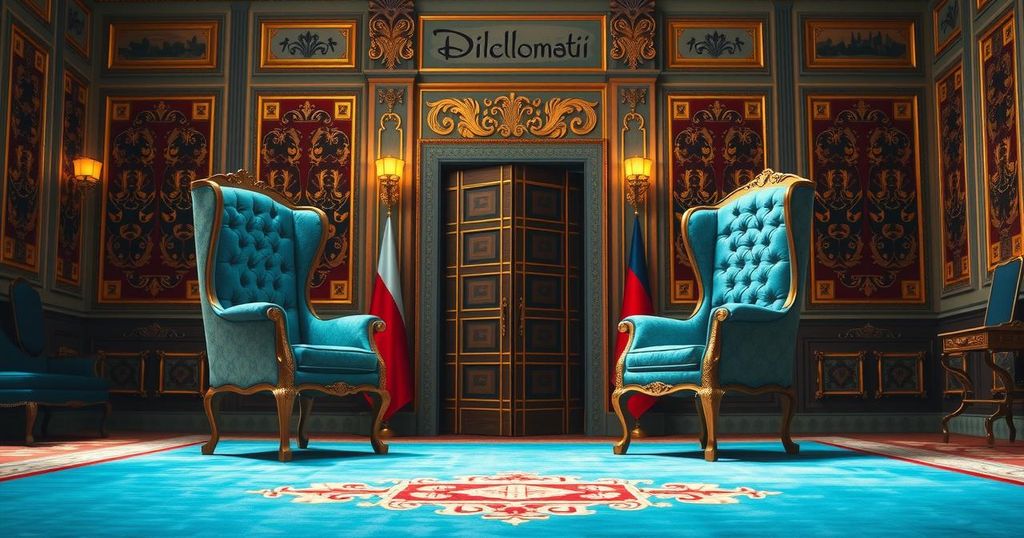Global news
AFRICA, AFRICA SERVICE, ANGOLA, CONGO (KINSHASA), DEMOCRATIC REPUBLIC OF, DEMOCRATIC REPUBLIC OF THE CONGO, DIPLOMACY, EBUTELI INSTITUTE FOR POLITICAL ANALYSIS, FELIX TSHISEKEDI, INTERNATIONAL RELATIONS, KAGAME, KINSHASA, NORTH AMERICA, PAUL KAGAME, REGIONAL COOPERATION, REGIONAL SECURITY, RFI, TRES, TRESOR KIBANGULA, TS, TSHISEKEDI, UNITED NATIONS, UNITED STATES
Marcus Li
0 Comments
Tshisekedi and Kagame Engage in Crisis Talks in Qatar to Address Eastern DRC Conflict
French President Felix Tshisekedi and Rwandan President Paul Kagame met in Qatar to negotiate solutions to ongoing security issues in eastern DRC, particularly related to the M23 rebellion. They affirmed a commitment to a ceasefire and emphasized the need for direct political dialogue. Regional powers and the influence of international sanctions are significant factors in this critical diplomatic engagement.
On Tuesday, Felix Tshisekedi, the President of the Democratic Republic of the Congo (DRC), met with Paul Kagame, the President of Rwanda, in Qatar for negotiations mediated by the emir. This meeting aimed to address the ongoing security crisis in eastern DRC, particularly the accusations against Rwanda for supporting the M23 rebellion, which has gained significant control in South and North Kivu provinces. These accusations have been corroborated by various United Nations reports, but Kigali has consistently denied them.
The meeting commenced at 4pm local time in Doha and lasted approximately 45 minutes, described as being held in a “cordial” atmosphere. The emir’s involvement was pivotal, especially given previous attempts at dialogue in January 2023, which were abruptly canceled. Experts noted that pressure from Western sanctions has influenced Kagame’s approach, while Tshisekedi is considering negotiation with the M23, reflecting a shift in the power dynamics as the armed group expanded its territorial control.
Following their discussions, both presidents have championed an “immediate and unconditional ceasefire.” This declaration came shortly after a planned peace talk in Angola was not realized due to the M23’s last-minute withdrawal. According to a source from the DRC presidency, this meeting was kept discreet until Tshisekedi’s return to Kinshasa. A subsequent statement emphasized a commitment to achieving a stable future for the DRC and its surrounding region.
Additionally, Kagame underscored the necessity for a “direct political dialogue” with all parties to effectively tackle the conflict’s root causes. The Rwandan presidency confirmed that an “immediate and unconditional ceasefire” was established and indicated that implementation details would be finalized in the near future.
Earlier on the same day, Angola announced the cancellation of peace talks, attributing this to M23’s withdrawal. The group accused certain international bodies of undermining the peace process, particularly citing sanctions imposed by the European Union as a barrier to effective dialogue. These sanctions have targeted various Rwandan military leaders for their role in supporting armed fighters in eastern DRC.
The M23’s aim has been to advocate for the interests of Congolese Tutsis, evidenced by their recent capture of Goma and Bukavu. These advances have led to significant casualties, with over 7,000 reported deaths, according to the DRC government. Although Rwanda denies its military support for the M23, it claims to face threats from the FDLR group, which has historical ties to the Rwandan genocide of the 1990s.
In summary, the meeting between Presidents Tshisekedi and Kagame signifies a crucial step towards addressing the ongoing conflict in eastern DRC. With a clear commitment to a ceasefire and the encouragement for direct dialogue, there is a hopeful prospect for stability in the region. However, the influence of external pressures, such as sanctions and prior military actions, remains a critical element in shaping future discussions and outcomes.
Original Source: www.rfi.fr




Post Comment